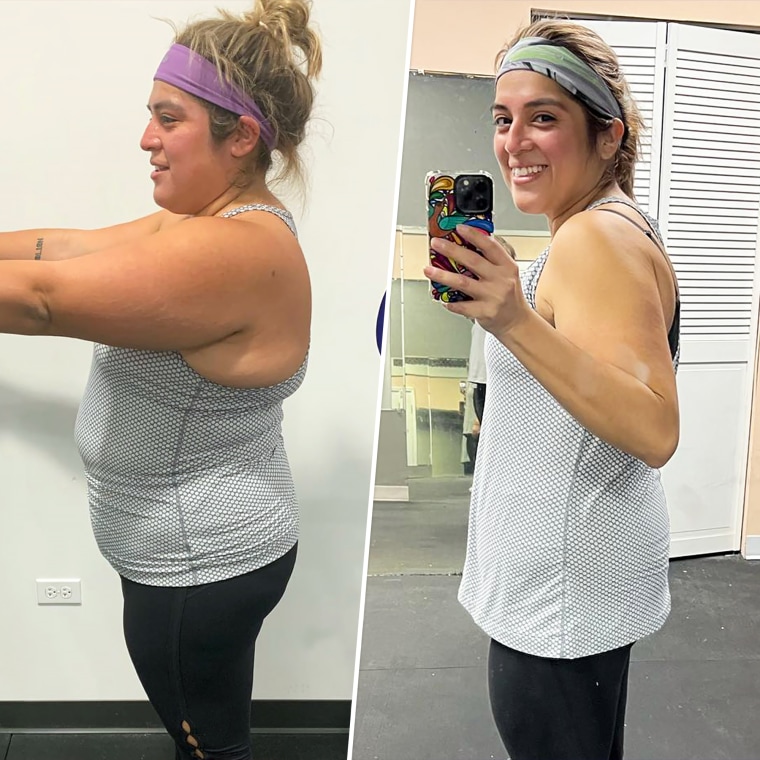After 15 months of taking the Ozempic-like weight loss drug Wegovy, Jamel Corona has lost 60 pounds — a boost she says she needed to prevent herself from developing Type 2 diabetes.
Corona was pre-diabetic and her doctor wanted her to lose weight, but despite working out and eating healthy food, the scale never moved no matter what she did, she says — until she began the treatment.
But there was an unexpected side effect after Corona started the medication: She no longer drinks alcohol.
The Chicago accountant used to enjoy drinking socially, consuming a glass of wine after work or a few beers during a night out — perhaps three to four drinks a week. But now alcohol is a “hard pass,” she says, noting she doesn’t enjoy anything about it anymore.
“I don’t like the way it makes me feel,” Corona, 37, tells TODAY.com.
“I can’t tolerate beer at all so I haven’t had any beer in months. … I don’t remember the last time I’ve had wine. It’s just too sweet.”

She’s had a particular aversion to beer since August 2022 — or nine months into her treatment with Wegovy when she was already at the highest dosage of the medication — when a trip to a brewery for her husband’s birthday turned into a nightmare.
Corona had three beers in a four-hour period and says it’s the only time she’s ever gotten physically sick from alcohol. She became intoxicated faster and it upset her stomach, causing her to throw up uncontrollably.
“I just had a really horrible reaction to it. And I was like, I never want to feel like that again,” Corona says.

She now has a drink every other month, if that, in social situations. The only drink she tolerates is vodka water with a lime and “extra, extra ice so that it dilutes it,” she says.
Lack of interest in alcohol
Corona’s experience, which she has documented on TikTok, is being echoed by other patients taking Wegovy or Ozempic. Online message boards show people commenting that alcohol now “grosses me out” or reporting that “I used to love wine, and now I can’t stand the smell” since taking the medication.
Doctors prescribing the drugs notice it, too.
“In some patients, we’ll see a reduction in the urge to drink alcohol and in others that doesn’t happen. We don’t completely understand why that is,” Dr. Louis Aronne, an obesity medicine physician and director of the Comprehensive Weight Control Center at Weill Cornell Medicine and NewYork-Presbyterian, tells TODAY.com. He is a scientific adviser for Novo Nordisk, the pharmaceutical company that makes both Ozempic and Wegovy.
The phenomenon makes sense to a certain extent, said NBC senior medical correspondent Dr. John Torres on TODAY.
The active ingredient in Ozempic and Wegovy is semaglutide, a synthetic version of a hormone known as GLP-1, which the body produces when a person eats. Patients taking the medication have reduced appetite, and when they do eat, they feel full sooner, he noted.
When the medication hits GLP-1 receptors in the brain, patients report they stop obsessing about food and some also say it reduces their interest in alcohol, which may indicate the same part of the brain is affected, Torres said.
Aversion to alcohol was not a commonly reported adverse event during the clinical development programs of Ozempic or Wegovy, Novo Nordisk said in a statement to TODAY.com. It's also not listed as a potential side effect in the prescribing information for Ozempic or Wegovy.
Novo Nordisk has not done studies to specifically assess the safety and efficacy of Ozempic or Wegovy in patients who drink alcohol, the company added.
Anecdotal reports from some social media users have also suggested that semaglutide may reduce cravings for other addictive behaviors, such as vaping and gambling.
“I used to vape like a demon. Quick cold turkey,” one user of the medications wrote online, TODAY reported in a May 24 segment. Added another person: “I used to buy scratch off ... and lotto tickets ... I don’t even think about it anymore.”
'Promising' for alcohol use disorder, but more data needed
Christian Hendershot, an associate professor at the Bowles Center for Alcohol Studies at the University of North Carolina at Chapel Hill, is leading a clinical trial that will investigate if Ozempic or Wegovy reduces the cravings to drink.
The desire for alcohol appears to be blunted while taking the medication based on comments patients make, but it’s all anecdotal data so far.
Hendershot has seen online posts from people reporting they’ve lost interest in drinking, are put off by the smell and taste of alcohol, feel nausea or experience more severe hangover symptoms.
Animal studies show GLP-1 receptor agonists like semaglutide reduce alcohol intake in rodents, but there is no research in humans yet to confirm what’s being reported by patients, he says.
“It’s a very unique situation because the extent of the anecdotal data has really outpaced any clinical data that we have available right now,” Hendershot tells TODAY.com.
“Certainly from the anecdotal reports, it seems that there is a signal there, and the reason that’s promising is that there’s a significant need for new therapies for alcohol use disorder. … So when you hear about things like this, it’s certainly a good reason to start studying it.”
Almost 30 million teens and adults in the U.S. in the past year had alcohol use disorder — the inability to stop or control drinking — in the past year, according to the National Institute on Alcohol Abuse and Alcoholism.
The theories about why semaglutide might lessen the desire to drink include that it might reduce a person’s appetite not only for food but other things they like to consume, or diminish their pleasure in various activities, Hendershot says.
Neuroscientist Gregg Stanwood, Ph.D., said in a May 24 segment on TODAY that there's a growing sense that semaglutide "appears to blunt the effects of dopamine in the brain," aka the feel-good chemical, which reduces cravings because patients don't get the same high from these activities that they did previously.
Hendershot says he's starting to hear reports that doctors are prescribing Ozempic or Wegovy off-label for people with alcohol concerns, and urged caution until more evidence is available about whether semaglutide is safe and effective for alcohol use disorder.
The medication slows down stomach emptying, so it’s likely to affect blood alcohol levels, Hendershot notes. He’s seen anecdotal reports from people commenting that they feel alcohol is sticking around in their body a lot longer. Then there is the question of whether the drug would stop working for alcohol cravings when people stop taking it, the way it does for weight loss.
“It’s certainly generated a lot of hype and now that hype has extended to behaviors that are outside the domain of the original indication of the drug,” Hendershot says.
“We have to be cautious. We have to collect more data.”
More on Ozempic and Wegovy
- How does the drug in Ozempic and Wegovy help you lose weight?
- Is the compounded version of Ozempic safe for weight loss?
- How to eat healthy if you're losing weight with Ozempic or Wegovy
- What it feels like to take Ozempic and Wegovy: Patients share experiences with popular drug
- Is it safe to take the anti-obesity drug Wegovy long-term? Doctors weigh in
